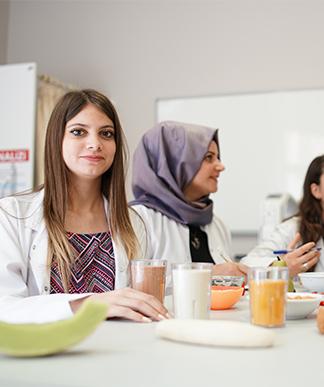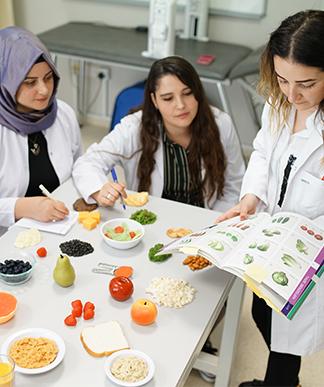


About the Department
The purpose of the Department of Nutrition and Dietetics is to contribute to society by training individuals, studies nutrition for the protection of health, the improvement of diseases, and establishing adequate and balanced nutrition awareness in society.
In the first stage of the education program, there are courses in areas such as basic sciences, health, and administrative sciences, while in the second stage, there are courses in areas such as diet therapy, management of food and beverage systems, nutrition in special cases and community nutrition. In addition to the theoretical teaching and laboratory practices in the classroom, students reinforce their knowledge with projects, public health internships, and on-the-job training. Students do clinical internships in adult and children's hospitals, and institutions that provide food and beverage services such as food factories, schools, and public institutions.
Students who successfully complete their four-year education are entitled to receive the "Nutrition and Dietetics Undergraduate Diploma" and the title of "Dietitian".
Mission
Conforming to the specified qualifications, within the framework of international standards, in order to improve, develop and improve the quality of life, and protect the health of the society with lifetime knowledge, skills, innovator values, and adequate and balanced nutrition. Train a dietitian with a student-centered, multidisciplinary approach, and based on science and technology, also provide education, training, research and consultancy services.
Vision
To be a department with national and international recognition that contributes to the improvement of public health with its scientific research, the modern education it offers, with its qualified and equipped graduates who are committed to ethical values.
Education Opportunities
The dietitian profession is defined as a healthcare professional in the relevant law. For this reason, students' education is planned according to universal qualifications in order to meet the needs of modern healthcare services, equipped with knowledge, skills and attitudes, and solve health problems by working in a team.
In the education and training program, students support the knowledge gained from their theoretical education with their applications in nutrition principles, anthropometry, food chemistry and microbiology laboratories. With the public health internship, students contribute to the solution of the nutrition problems of society in the field and are involved in processes that inform society with accurate information and raise awareness. With institutional and hospital nutrition internships, students do their adult, pediatric and collective nutrition systems internships in private and public hospitals.
Students can do a double major with the following departments: Anesthesia, Physiotherapy (associate degree), Physiotherapy and Rehabilitation, Gastronomy and Culinary Arts, Nursing, Law, First and Emergency Aid, Molecular biology and Genetics, Preschool Teaching, Psychology, Guidance and Psychological Counseling, Health Management, Social Work, Turkish Language and Literature and International Trade and Business

Accreditation and Memberships
CIU Faculty of Health Sciences, Nutrition and Dietetics Undergraduate Program was awarded a 2-year accreditation between 19 March 2021 – 30 September 2023, as a result of the evaluation made by the Health Sciences Education Programs Accreditation Board (HSEPAB). Within the scope of the accreditation process, within the framework of the criteria determined by HSEPAB, improvements and innovations were made in the educational objectives of the program, curriculum syllabus and course contents in accordance with the views and demands of internal and external stakeholders. Within the framework of accreditation studies, great steps are taken to increase the various activities and seminars currently held in order to contribute to the academic development of the academic staff, to increase student satisfaction, to increase the employment opportunities of graduates and to facilitate the exchange of students and lecturers between universities.
Career Areas
A dietitian is a health professional who has successfully completed the nutrition and dietetics education program and is entitled to practice and practice this profession by obtaining a "Nutrition and Dietetics Undergraduate Diploma". As the importance of nutrition in growth, development, protection of lifelong health, increasing the quality of life and treatment of health problems has been understood, the need for dietitians, who are an important member of the health team, has also increased.
Working Areas of Dietitians:
Inpatient and outpatient treatment institutions (private and public hospitals, polyclinics, health centers, dialysis units, etc.), collective nutrition systems (food factories, hotel food and beverage departments, all private and public institutions that provide mass nutrition, etc.), public health Institutions that provide services (Mother-child health centers, health centers, child and elderly nursing homes, sports schools, etc.), Dialysis Centers, Enteral - parenteral nutrition team, special diet polyclinics, food industry, public health services, maternal and child health centers, family health centers, elderly care centers, sports centers, education and research institutions.
Contact
Faculty of Health Sciences
Çevik Uraz Center, CU206
Tel: +90 392 671 1111 Extension: 2251
Faculty E-mail: secretary-fhs@ciu.edu.tr
Head of Department: Asst. Prof. Dr. Nazife HÜRER
Head of Department E-mail: nhurer@ciu.edu.tr
Compulsory Courses
First Semester
PROFESSIONAL ORIENTATION AND ETHIC
Course code
BESD109Credit
2Theoretical
2Practical
0Ects
4MEDICAL BIOLOGY AND GENETICS
Course code
BIYO110Credit
3Theoretical
2Practical
2Ects
5ELEMENTARY ENGLISH-I
Course code
INGL123Credit
3Theoretical
3Practical
0Ects
4GENERAL CHEMISTRY
Course code
KIMY110Credit
4Theoretical
3Practical
2Ects
6INTRODUCTION TO MATHEMATICS-I
Course code
MATE111Credit
2Theoretical
2Practical
0Ects
4INTRODUCTION TO PSYCHOLOGY
Course code
PSKO121Credit
2Theoretical
2Practical
0Ects
4TURKISH LANGUAGE
Course code
TREG100Credit
0Theoretical
2Practical
0Ects
2Second Semester
ANATOMY
Course code
ANAT130Credit
4Theoretical
3Practical
2Ects
5DEMOGRAPHIC STRUCTURE AND HEALTH
Course code
BESD108Credit
2Theoretical
2Practical
0Ects
2BASIC COMPUTING
Course code
BILT110Credit
3Theoretical
3Practical
0Ects
4PHYSIOLOGY
Course code
FIZY110Credit
3Theoretical
3Practical
0Ects
4ELEMENTARY ENGLISH-II
Course code
INGL124Credit
3Theoretical
3Practical
0Ects
4GENERAL MICROBIOLOGY
Course code
MIKB112Credit
3Theoretical
2Practical
2Ects
4FREE ELECTIVE
Course code
SSECXX1Credit
2Theoretical
2Practical
0Ects
6MODERN TURKISH HISTORY
Course code
TARH100Credit
0Theoretical
2Practical
0Ects
2Third Semester
PRINCIPLES OF NUTRITION -I
Course code
BESD201Credit
4Theoretical
2Practical
4Ects
6NUTRITIONAL BIOCHEMISTRY I
Course code
BESD205Credit
3Theoretical
3Practical
0Ects
4FOOD CHEMISTRY AND ANALYSIS I
Course code
BESD207Credit
3Theoretical
2Practical
2Ects
5FREE ELECTIVE
Course code
SSECXX2Credit
2Theoretical
2Practical
0Ects
6UNIVERSITY ELECTIVE
Course code
UNISXX1Credit
3Theoretical
3Practical
0Ects
4UNIVERSITY ELECTIVE
Course code
UNISXX2Credit
3Theoretical
3Practical
0Ects
4Fourth Semester
NUTRITIONAL BIOCHEMISTRY II
Course code
BESD206Credit
3Theoretical
3Practical
0Ects
4FOOD CHEMISTRY AND ANALYSIS II
Course code
BESD208Credit
3Theoretical
2Practical
2Ects
5MICROBIOLOGY
Course code
BESD210Credit
3Theoretical
3Practical
0Ects
4PRINCIPLES OF NUTRITION -II
Course code
BESD218Credit
4Theoretical
2Practical
4Ects
6FREE ELECTIVE
Course code
SSECXX3Credit
2Theoretical
2Practical
0Ects
6FREE ELECTIVE
Course code
SSECXX4Credit
2Theoretical
2Practical
0Ects
6Fifth Semester
MOTHER AND CHILD NUTRITION
Course code
BESD301Credit
3Theoretical
2Practical
3Ects
4DETERMINATION OF NUTRITIONAL STATUS IN SOCIETY
Course code
BESD303Credit
2Theoretical
1Practical
2Ects
2INSTITTUTIONAL NUTRITION I
Course code
BESD305Credit
3Theoretical
3Practical
0Ects
4DIET THERAPY OF DISEASE I
Course code
BESD307Credit
3Theoretical
2Practical
2Ects
6NUTRITION EDUCATION
Course code
BESD309Credit
2Theoretical
2Practical
0Ects
2AREA ELECTIVE
Course code
BESDXX1Credit
2Theoretical
2Practical
0Ects
5AREA ELECTIVE
Course code
BESDXX2Credit
2Theoretical
2Practical
0Ects
5RESEARCH METHODS IN HEALTH SCIENCES
Course code
SGBL300Credit
2Theoretical
2Practical
0Ects
3Sixth Semester
NUTRITION IN CHILDHOOD DISEASES
Course code
BESD302Credit
3Theoretical
2Practical
3Ects
5EPIDEMIOLOGY AND NUTRITION PROBLEMS in THE COMMUNITY
Course code
BESD304Credit
2Theoretical
1Practical
2Ects
3INSTITTUTIONAL NUTRITION II
Course code
BESD306Credit
3Theoretical
3Practical
0Ects
4DIET THERAPY OF DISEASE II
Course code
BESD308Credit
3Theoretical
2Practical
2Ects
6FOOD CONTROL AND LEGISLATION
Course code
BESD310Credit
2Theoretical
2Practical
0Ects
3AREA ELECTIVE
Course code
BESDXX3Credit
2Theoretical
2Practical
0Ects
5BIOSTATISTICS
Course code
ISTA310Credit
2Theoretical
2Practical
0Ects
3Seventh Semester
PUBLIC HEALTH INTERNSHIP
Course code
BESD400Credit
0Theoretical
0Practical
0Ects
5NUTRITION TRAINING INSTITUTIONS AND HOSPITALS I
Course code
BESD401Credit
11Theoretical
2Practical
18Ects
15SEMINAR
Course code
BESD403Credit
0Theoretical
2Practical
0Ects
2GRADUATION STUDY I
Course code
BESD405Credit
2Theoretical
2Practical
0Ects
2AREA ELECTIVE
Course code
BESDXX4Credit
2Theoretical
2Practical
0Ects
5Eighth Semester
INSTITUTIONS AND HOSPITAL NUTRITION PRACTICE II
Course code
BESD402Credit
12Theoretical
2Practical
20Ects
17GRADUATION STUDY II
Course code
BESD406Credit
2Theoretical
2Practical
0Ects
2AREA ELECTIVE
Course code
BESDXX5Credit
2Theoretical
2Practical
0Ects
5AREA ELECTIVE
Course code
BESDXX6Credit
2Theoretical
2Practical
0Ects
5HEALTH MANAGEMENT
Course code
SGBL412Credit
2Theoretical
2Practical
0Ects
2Elective Courses
WORLD CUISINE
Course code
BESD211Credit
2Theoretical
2Practical
0Ects
5NUTRITIONAL ANTHROPOLOGY
Course code
BESD212Credit
2Theoretical
2Practical
0Ects
5ELDERLY AND NUTRITION
Course code
BESD412Credit
2Theoretical
2Practical
0Ects
5DIETETICS PRINCIPLES OF CHILDHOOD DISEASES AND PROBLEMS
Course code
BESD314Credit
2Theoretical
2Practical
0Ects
5ADOLESCENT EATING DISORDERS
Course code
BESD315Credit
2Theoretical
2Practical
0Ects
5NUTRITION AND HEALTHY LIFE
Course code
BESD214Credit
2Theoretical
2Practical
0Ects
3SPORTS NUTRITION
Course code
BESD410Credit
2Theoretical
2Practical
0Ects
5HEALTHY FOOD CHOICE
Course code
BESD215Credit
2Theoretical
2Practical
0Ects
5FOOD-DRUG INTERACTION
Course code
BESD408Credit
2Theoretical
2Practical
0Ects
TURKISH CUISINE
Course code
BESD240Credit
2Theoretical
2Practical
0Ects
5FOOD PRODUCT SUPPORT AND FUNCTIONAL FOOD
Course code
BESD409Credit
2Theoretical
2Practical
0Ects
5MENU PLANNING IN INSTITUTIONAL FOOD SYSTEM
Course code
BESD313Credit
2Theoretical
2Practical
0Ects
5POPULAR DIETS AND HEALTH
Course code
BESD415Credit
2Theoretical
2Practical
0Ects
5CANCER AND NUTRITION
Course code
BESD425Credit
2Theoretical
2Practical
0Ects
5BIOCHEMISTRY OF NUTRITION AND RELATED DISEASES
Course code
BESD411Credit
2Theoretical
2Practical
0Ects
5COMMUNICATION IN HEALTH
Course code
SGBL260Credit
2Theoretical
2Practical
0Ects
5PUBLIC HEALTH AND MEDICAL DEONTOLOGY
Course code
SGBL202Credit
2Theoretical
2Practical
0Ects
0SPINE HEALTH
Course code
FTRE331Credit
2Theoretical
2Practical
0Ects
5TR Applicants
TR Students who are successful in the exams conducted by the Higher Education Council Student Selection and Placement Center (ÖSYM) and are entitled to enroll in our university in line with their preferences can complete the registration process with the necessary documents for registration from our Registration and Liaison Offices throughout Turkey or from the Marketing Directorate on campus.
Click for detailed admission requirements information.
TRNC Applicants
TRNC citizens and TR citizen candidate students who have completed their entire high school education in TRNC. They are placed in undergraduate programs in line with their success in the CIU Student Placement and Scholarship Ranking Exam and the programs they prefer.
Students who are successful in the exam can register from the TRNC Marketing Office.
Applicants can directly apply online to our undergraduate programs using the application portal. Please fill in your details correctly and upload all the required documents listed on the last page of the application form.
Required documents;
- Completed application form,
- Higher/Secondary Certificate or equivalents (e.g. O/A’Level, WAEC/NECO),
- Evidence of English Language competence: TOEFL (65 IBT) or IELTS (5.5). Students without these documents will take the CIU English proficiency exam on campus following arrival,
- Scanned copy of international passport/birth certificate,
- Fully completed and signed CIU Rules and Regulations document (which can be downloaded during the online application).
Cyprus International University provides academic scholarships for its students as an incentive for success, with most students benefiting from 50%, 75% or 100% scholarships or discounted tuition fees. Click for more information.
Tuition Fees are determined at the beginning of each academic year. Candidate students who are entitled to enroll in CIU can learn their fees in line with the Tuition Fee Calculation system.
The mission of the department is to establish a unique educational environment formed by the integration of different components such as information at global standards, research activities, contributions to science, sharing information and aesthetic values. Further aims of the department is to graduate expert professionals who would respect the values of the society, protect human health in line with scientific principles based on evidence and work in relevant areas to cure illnesses. In terms of the society, Department of Nutrition and Dietetics aims to provide contributions by educating qualified health professionals, educators and researchers serving the society in accordance with scientific findings and ethical values.
- To work as an academic who has the knowledge to research, apply, evaluate the accuracy, reliability and validity of current developments based on evidence and basic knowledge in the field of nutrition and dietetics,
- To determine the energy and nutrient needs of healthy individuals, to work in nutrition and diet counseling centers in line with adequate and balanced nutrition rules,
- To work in family health, community health and healthy living centers for the protection, improvement and development of health by using methods for determining the nutritional status of society,
- To work in public, private and university hospitals to evaluate the nutritional status of sick individuals and to apply patient-specific medical nutrition treatments based on their clinical findings,
- Nursery, school, hospital, catering companies, nursing homes, etc. in order to ensure nutrition and food safety in accordance with the needs of individuals and groups in the production consumption chain. is to train dietitians who will work in institutions where mass nutrition is provided, adopt professional ethical rules and respect the universal law.
- Has the theoretical and applied knowledge required by the dietitian profession.
- Uses the knowledge and skills acquired in the field as an example throughout her/his professional life, in the protection and improvement of individual, family and community health, in the prevention and treatment of diseases.
- Provides training and consultancy by using scientific evidence in order to increase the health level and quality of life of society.
- Uses learning to learn, critical thinking, problem solving and decision making skills in the field of Nutrition and Dietetics.
- Uses information technologies and technological equipment specific to the field effectively.
- Maintains personal and professional development with the awareness of lifelong learning..
- Carries out his profession in accordance with the legal framework, ethical principles and standards
- Uses her/his professional skills in accordance with the basic values and culture of the society at national and international level.
- Acts in accordance with quality management processes.
- Takes a role in research, projects and activities in cooperation with the healthcare team and other disciplines.
- Have the ability to follow the information in the professional field and to communicate with colleagues by using Turkish and at least one foreign language.
1- Strategic Goals of the Nutrition and Dietetics Department
2- Letter Grade Appeal Workflow Chart
3- Student's Letter Grade Objection Process Guideline
4- Deregistration Workflow Guide
5- Student Double Major Registration Acceptance Guidelines
6- Make-Up Exam Procedure Guide
7- Summer Term Registration Workflow Guide